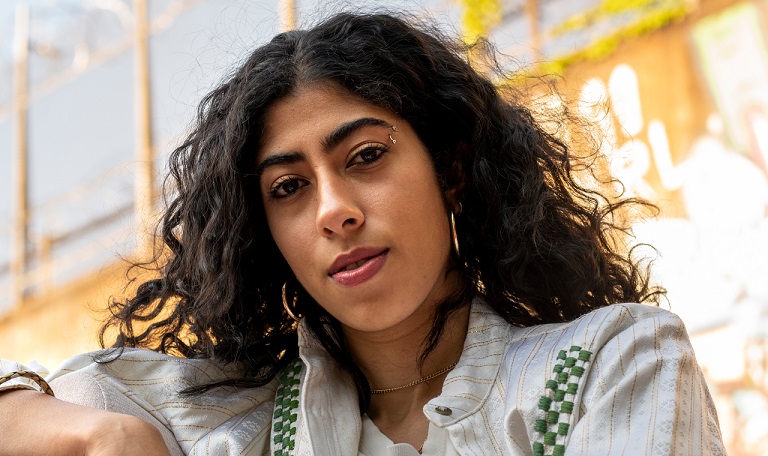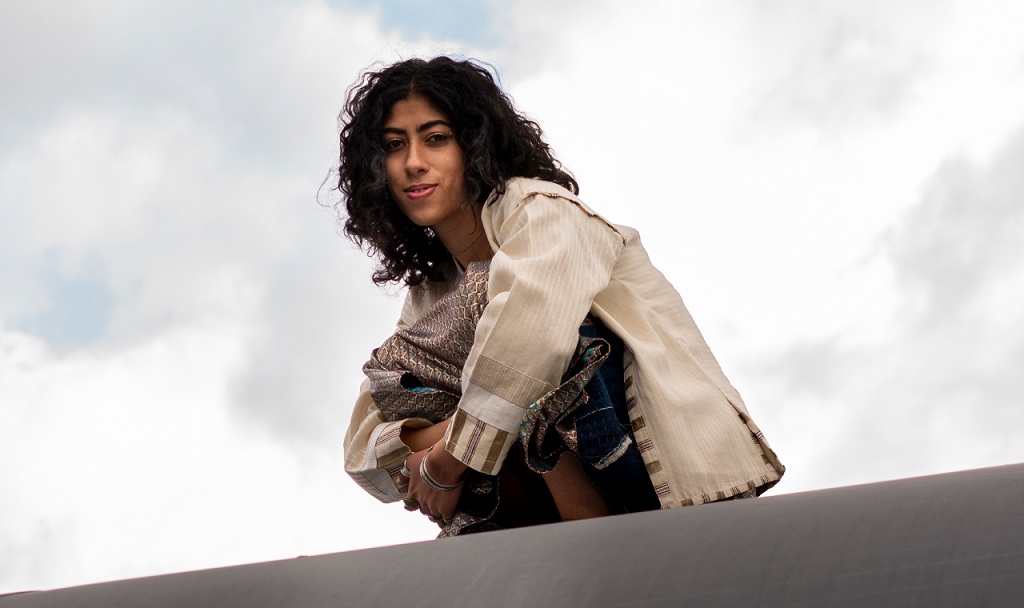The Cairo-born, New York-based artist would be best introduced as Ms. Smooth. Felukah has an impressively natural slur when switching between Arabic and English lyrics, similar to the way she can rap about her grandmother’s recipes and the Arab diaspora in the same sentence. The revitalizing sound of female hip hop sets her apart, but it is truly in her words which puts her on a pedestal.
Fresh-breeze Felukah sails through the scene with a strong literary background, talent, and her own personal freedom, which she’s coined “The Felukah Philosophy”. Felukah’s philosophy is all that is free: freestyle, free flow, free words, free world. She invites listeners to explore the cities she lives in (Cairo, Citadel, Harlemite Honey…), the politics that bound and surround her, and the genres that define her. The artist dances around these concepts but doesn’t linger too long — the ever-fleeting Felukah moves on, always one step ahead of the game, leaving us with the tasty musical remains.
So, you study creative writing! Could you tell us about some of your favorite books or pieces of writing that deeply affected you or your music?
I’m currently in my final semester at school but I feel like I’ll always be a scholar. Writers like Radwa Ashour, Haruki Murakami, and poets like Nayyirah Waheed and Ocean Vuong inspire me deeply. The prose/poetry speaks volumes to me, so much so that it pushed me into the studio. Long before I found music I was pushing my own poetry and attending my favorite authors’ readings around Cairo, New York, and London. I like the idea of staying connected to print as I explore sound — the same way I never want to lose touch of dance. These various mediums speak to me and have shown me more about myself and others than I could have dreamed possible.
What is a recurring emotion you’ve noticed that pushes you to write?
Interesting question. Any strong emotion that passes through my spirit will push me to write; the gravity of the feeling is usually inspiring enough, whatever amalgamation of feelings that may be. Strong emotions like love, pain, and injustice will force me to express myself first in dance (either in my room with my headphones blaring or on the roof maybe), before later transcribing the dance/emotion into lyrics and melodies. It’s an open flow between external stimuli and internal transformation.
What makes the hip hop scene in Egypt different or similar to the USA?
As an artist, notions of collective memory and collective consciousness are fused into my work. Egyptian culture is rich in history — our people demonstrate real resilience. I feel like that resilience carries through to the hip hop scene, and to other artistic scenes as well; there is a certain yearning for the release of energy, pent up from decades or just days past; there’s something deeper compelling us to create, to express, to resist… Colonialism. Community. Koshari. I don’t know for sure. The same could be said for people in the States, though. Deeper forces are universal and speak to quality artists everywhere.
You’ve mentioned that the Arab hip hop and trap scene is on the rise — why do you think so? What fuels this movement?
I think we’re encountering a very interesting time for music in general in the Arab scene. I can only speak for myself and my own circle, but it feels as though my generation and the next are waking up to a certain postmodern pride in the dynamic nature and true evolution of Arab music and culture. We are not bound by tradition, we are fueled by it and moved to the point of crossover: where Middle Eastern essence meets Western delivery. The infrastructures put in place by non-Arabs are now being utilized and perfected by Arabs — this is how we know we are moving forward. I want to see more of my Egyptian and non-Egyptian Arab friends getting their music on Spotify and Apple Music trending in cities like Berlin and Paris. I want them to see themselves in the music that is created by people like them, accessible to people everywhere.
How would you envision your sound and image’s ideal impact on the world?
When I think impact, I think of inspiring a generation of people who strive to push love beyond all else. I want to encourage a closeness to the soul, an understanding of the spirit as it relates to music, narrative, craft. Topically, I want to empower women to break the silence and voice their thoughts and opinions on matters that’ve made men (and other women) uncomfortable in the past. I want to explore spaces and topics of real truth, whether that comes with pain or power is besides the point. Art will always give to you what you pour into it. I want to inspire people to create and to question, whilst bopping like a G.
I’ve noticed your music videos are filled with a majority female cast. Could you tell us a bit about the creative process behind turning your music into visuals?
For many of the visuals we’ve created, I’ve almost fully trusted the artistic vision of who I’m collaborating with. The way many of the projects I’ve put out have worked is by people reaching out to me or me to them, pitching an idea, and expressing precise vision that remarkably and organically aligns with one another. I work in all fields under this premise; if it feels right to be connecting, the right collaboration will ensue. The balance of energies onset has lent itself to a majority female cast in the past; I’ve also made it a point to make sure the representation I want to promote carries through both sound and image. It’s like coming full circle and manifesting a whole vision.
In your own words, how would you define your sound?
It’s difficult to pinpoint; my sound has changed a lot since I started making music. I gravitate towards old school flows and bar-spitters like Nas and Andre 3000. I also like to employ honey melodies like Erykah Badu and Fairuz. Moving forward from this album I want to explore more soul. Jazz also calls. At the root of anything I’ve ever created is a freestyle; I can only define my sound in the moment.

How would you describe what you do for a living to an older generation Arab like your grandmother?
Interestingly closer to poetry and live oration than just singing. There’s storytelling going on; there’s a call out to family heirlooms and past generations always. I want to bridge the gap between my Mom and I in my music — come to a middle ground that we’re both comfortable with and one that does not push me to be dishonest and perpetuate shame culture within my own psyche. If I can make music that exists in that space, music that can make someone like my grandmother smile because I mentioned a bit of her recipe for fried fish while rapping about college in New York, then I’m set.
What is the greatest fear you had to overcome to get where you are today?
Honestly, in the beginning I was bugging about my parents thinking negatively or being ashamed of me speaking out about personal issues on the mic. Topics I gravitate to are taboo or were at some point and still make some members of the older Arab generation uncomfortable. As I continued to sharpen my vision and entire approach to The Felukah Philosophy, my parents came to realize the gravity of the work I wanted to create and have truly supported my every move since. I’ve also had to deal with my own limitations and insecurities as a majorly underrepresented Arab woman in America, and as a Westernized Egyptian in Cairo. Creating my own blueprint for this music flex has been and continues to be difficult, but it is incredibly rewarding and motivating at the same time. I rise to the occasion of setting my own scene for this in-between.
By using explicit words and ideas in your lyrics, is there a particular feeling you are trying to evoke or achieve?
Code-switching between English and Egyptian Arabic keeps my delivery true to my state of being. By the mere virtue of using Arabic, I am evoking the culture as a presence in the music and in the environment in which it plays. Mentioning landmarks like Kobri Qasr Elnil in Cairo or 125th Street in Harlem, New York is intended to spark a sense of cultural appreciation and real representation for the people that live there/identify with the city.
What was it like growing up in Cairo? What is your most vivid (music or not) memory as a child?
Growing up in Cairo was interesting because we had a very Western experience in a Middle Eastern context. You go from speaking Arabic to people on the street to speaking New York lingo on the phone with your friends, consuming an almost equal intake of both cultures, constantly. One of my favorite memories of Cairo is when my mother, an intellectual and scholar in her own right, introduced me to renowned author and activist Mona Prince. We spoke over Nescafe in a small but historic cafe called Cafe Riche. I carry this memory very close to my heart.
I heard you’re releasing your new album, Dream 23, in July — could you tell us a little bit about it?
Dream 23 differs both musically and lyrically from anything I’ve put out before. The music is vibrational, energetic, and calm at the same time — a quality I’ve always admired about timeless hip hop/R&B records. We’re serving old school flows on new school beats; lo-fi energy on heated topics like women’s empowerment, self-discovery, and cultural pride. The album lyrically and sonically explores space in the first half and Earth in the other, validating the dream world and the real world equally. It is split in so many ways: sonically, culturally, and spiritually. In this project I’m really trying to pay homage to both Egyptian roots and New York culture with each turn around the Sun. Since I’ve spun 22 times already, this album encompasses my own Dream 23. In another sense, the title can symbolize the sheer multiplicity of being; I could’ve chosen to chase one dream like rap, but instead it’s something more like 23 dreams — my interests multiply and deepen over time.
You have already achieved so much at such a young age [20 years old, if I’m not mistaken]. What do you hope to achieve or experience in the next decade?
I’m proud to say I’ll be 23 in February next year and that I’m blessed to have dreams that extend far beyond music. Beyond a few more albums and collaborations with artists I want to see through, I want to get closer to my dance background/instincts in the next decade. My first connection to music was through modern dance, which later evolved into jazz, ballet, and hip hop. The literary fire in me also compels me to sharpen my pen, endlessly. I see myself going in for a Masters degree in something dank like anthropology, publishing more of my own poetry and lyric books. All Things Fly is the last track on Dream 23 and it encompasses a sentiment I think about quite a lot in life and in art: all things fly if you choose to see wings; if you study the aerodynamics of thought and see a vision through. It’s really up to you.

